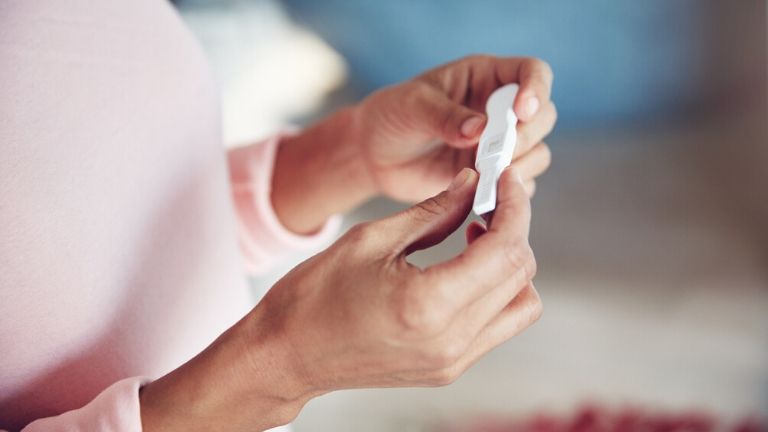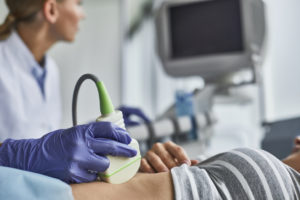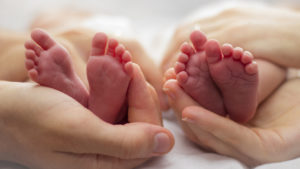To help kick off our Healthista Expert Collective series, obstetrician and gynaecologist Dr Larisa Corda, creator of The Conception Plan shares tips on how boost your chances of fertility if you’re over 40
Our society is changing and so are fertility rates. Recent news reported by the BBC a few months ago sent alarm bells ringing that for the first time ever, our population rates are in decline.
Not only are people choosing to have fewer children, but they are also leaving it until later in life to do so.
There is no doubt that over the last couple of decades, everything has changed for women. Finally, we’re beginning to gain an equal footing to men in terms of career opportunities and, understandably, the majority of women are making the most of these by creating an identity outside of their traditional role in the household.
Whilst this has brought personal satisfaction and financial freedom, it has also left many dealing with the problem of sub-fertility, or difficulty getting pregnant, as many chose to defer childbearing and wait for the right partner, rather than settling down too soon.
It’s also true that men, on the whole, are also deferring starting their families, so the two combined is leading to a global infertility epidemic.
We now hear that 1 in 6 couples, and up to 20% of individuals face trouble conceiving. This figure is only set to get higher as biologically, we struggle to keep up with the tremendous societal change that has occurred.
1 in 6 couples, and up to 20% of individuals face trouble conceiving
In fact, the only age group where fertility rates are on the increase is in the over 40s.
Which is a bit of an ironic paradox, in that this is also the age group where many will face tremendous struggles to conceive.
In 2017, just over 16 births per 1000 was to women aged 40 or over, according to the Office of National Statistics. Fertility rates decreased in 2017 overall and for every age group, except for women aged 40 years and over.
This trend is not going to reverse as women seek to create a stable set of circumstances for themselves before having children, that includes financial independence as well as a life partner.
As many are now recognizing that they may be affected by infertility at this stage of life, they are taking active measures such as egg freezing earlier in order to allow themselves a better chance of conceiving, should they need it later.
The most important determinant of a woman’s fertility is her age, and as a woman becomes older, the likelier it is that she may require assistance to become pregnant.
Over the age of 40, this assistance is likeliest to be IVF, but the success of this remains low if a woman uses her own eggs, due to the fact that they have declined in both number and quality.
Conception with donor eggs then becomes the most successful route to motherhood.
The average age of the menopause is between 48 and 52 in the UK, and for most women the peri menopause starts in their 40s.
Average age of the menopause is between 48 and 52 in the UK
Sadly, though, some women can end up undergoing early ovarian ageing much sooner, either because of a medical condition that affects them, or because they may have had surgery to remove their ovaries.
Or sometimes it happens totally unpredictably, though your risk is slightly higher if you have a relative affected by it.
The chance of concaving naturally around the peri menopause is very low, usually no more than around 2%, and even techniques such as IVF are limited due to the low number of eggs available and their significantly lower quality compared to younger eggs.
In addition, the risk of miscarriage becomes much higher, reaching 50% in women aged 45, as well as the risk of certain congenital abnormalities.
Traditionally speaking, all women are generally told to get on with having children before the age of 35.
But in reality, how many women in our modern era have the financial means, career freedom and a suitable partner to be able to do that with?
The short answer is not many and as a result of the growing demands being placed on women in our modern societies, we have to be able to provide better solutions and not discouragement for a trend that we cannot reverse and that is a direct consequence of our democratic and progressive society.
All too often women are unfairly criticized and judged when through no fault of their own they have to postpone childbearing.
Many decide to find the correct partner for life, rather than trying to beat their biological clock and settle too soon, or invest into their careers making themselves financially independent, only to find that whilst they’re feeding into our nation’s economic prosperity, they are ultimately being denied the chance of their own personal prosperity in terms of having a family.
Whilst there is nothing that medicine has yet offered us to reverse the effect of age on human eggs, there is plenty that can be done to help optimise their condition and to also help optimise a woman’s health before and during pregnancy, thereby reducing the risk of any obstetric complications.
And just as importantly, a new area of epigenetics is emerging which is showing us lifestyle measures, such as diet, can create lasting changes to the genetic blueprint of any offspring, meaning that a woman is able to have a certain degree of control on the health of her baby, by virtue of what she chooses to eat, how she exercises, manages stress and what she exposes herself to in her immediate environment.
I discuss this in The Conception Plan, which is just as applicable to women over 40 as it is to younger women. You can find more information here, but in summary, the main pillars are:
Over-40s fertility booster#1 – Exercise exercise exercise
Exercise to help boost the circulation to your reproductive organs and also to help you maintain a healthy body and mind.
This will also help you to keep weight within the normal range that is vital for fertility and helps to reduce the chance of miscarriage.
Over 40s fertility booster #2 – Minimise stress
Reduce stress and keep caffeine (which is a stress activator) to a minimum or avoiding altogether.
Stress can create an imbalance in your fertility hormones and also lead to problems with sleep and lowered libido, as well as problems with ovulation.
Over 40s fertility booster#3 – Sleep is your friend
Prioritise sleep and ensure your bedroom becomes a sanctuary that is conducive to sleep.
Sleep not only helps to combat stress, and improves libido, but it’s vital to processing unnecessary and harmful substances in the body that are made each day, it helps with weight loss, and also boosts immunity.
Over 40s fertility booster #4 – Go at it often
Have sex often and throughout your cycle.
Most people become too obsessed with the fertile window and sex can become a militaristic operation rather than a pleasure!
As long as you’re having sex several times a week, there will be sperm available to fertilise the egg, as sperm can survive in the reproductive tract for several days and recent studies are suggesting that the conventional advice of abstaining for a few days in between is perhaps overcautious and that sperm quality may actually improve with more regular sex.
Over 40s fertility boosters #5 – Cut the bad lifestyle choices
You absolutely need to stop smoking (even e-cigarettes, though the evidence for this is not yet uncovered) as this can cause damage to the lining of the womb, the eggs and sperm. It can also adversely affect the health of your child, and cause all sorts of complications in your pregnancy. You also need to minimise alcohol or ideally avoid it altogether.
Over 40s fertility boosters #6 – Reduce toxin exposure
Reduce toxin exposure that can be found in the water we drink, household cleaning products, cleaning products, the make up we put on our skin and the plastic we use to cover our food in.
The toxins we absorb can end up being harmful to our hormones that control fertility, as well as the eggs and sperm.
There are so many pollutants that we cannot avoid being exposed to when we step outside, but we need to be focusing on the environment we create inside our homes, and our bodies.
Being an older age mother can bring several health challenges. First of all there are the obstetric risks that become more common with age.
This includes things such as high blood pressure, diabetes, thyroid disorders, fibroids and also pre-eclampsia, all of which can complicate older pregnancies and lead to poorer outcomes for mother and child.
In addition, the risk of twin pregnancies becomes higher the older a woman is, both naturally and also via IVF, which can also make a pregnancy more complicated.
There are also the issues around child rearing, such as diminished stamina, and judgement from the outside world.
But it has a whole range of benefits too, such as better financial security and provision for the child, maturity of mind and approach to childcare, and as the latest research is suggesting, there may also be a health benefit to children in that studies have shown that those born to older mothers did better in cognitive ability tests than those born to younger mothers.
These tests are thought to be predictors for educational achievements and health in later life.
Pregnancy when you are in your 40s is becoming relatively common.
Instead of labeling women as geriatric or judging their decision to have children at this age, we need to be finding ways to support them and enable them to become mothers in the healthiest and safest way possible.
If we’re to help empower women, we need to be able to have open and honest conversations regarding the difficulties they may face around fertility, remove the stigma and offer better support and guidance.
Improving access and affordability of fertility treatment is the number one priority here that recognises the growing trend towards older age motherhood.
All women over 40 will have spent their entire lives investing into the health service only to then be told that the service they invested is not willing to offer them treatment for a condition that was imposed on them as a result of our modern means of living.
It’s time we stopped discriminating against older women and started helping them achieve their dreams that as human beings, we are all entitled to have.
Investing in women and children is an investment in our future generations and the stability of our economy, avoiding the socioeconomic consequences that have been predicted if we do not offer opportunities for fertility rates to increase, not to mention the personal sorrow of not being allowed to have a family of your own.
It’s no longer OK to just keep telling women to get on with having a family when they are younger.
As a society, we have progressed too far and life has become too complicated to be able to accept this as a realistic option.
But it is time for showing compassion and helping women fulfill the most basic and inherent of human needs. Our societies depend on it.
Dr Larisa Corda is an Obstetrician and Gynaecologist and Fertility Specialist MBBS BSc MRCOG. She qualified from Imperial College London and trained in the UK and Australia, gaining a wide understanding of womens’ health issues across an international population. She believes in a holistic approach to treatment that addresses many lifestyle factors as well as a combination of Eastern and Western principles, that underpin The Conception Plan she has devised, as seen on TV. Larisa is a passionate womens’ rights campaigner, with roles on a number of charities, and supports the use of natural and mild IVF techniques to assist conception where needed. She regularly appears in the media, and has several research interests including the effect of stress on fertility. To follow her advice and tips, including The Conception Plan, go to www.drlarisacorda.com and @drlarisacorda on Instagram.
As another one of our resident doctors on the new Healthista Collective which launches on Monday, Dr Corda will bring fertility advice to help Healthista readers.
Email us your feedback at editor@healthista.com. Remember this is your website, so tell us the content you want.
Relevant Healthista Content
How to increase fertility – the doctor’s guide
7 natural ways to increase fertility proven by science
10 foods that boost male fertility
10 supplements to help fertility
Other Healthista Content You May Like
The new Baby Botox – this is exactly what happens to your face
The secret to diet, exercise and skincare lies in your DNA
Like this article? Sign up to our newsletter to get more articles like this delivered straight to your inbox.
































































